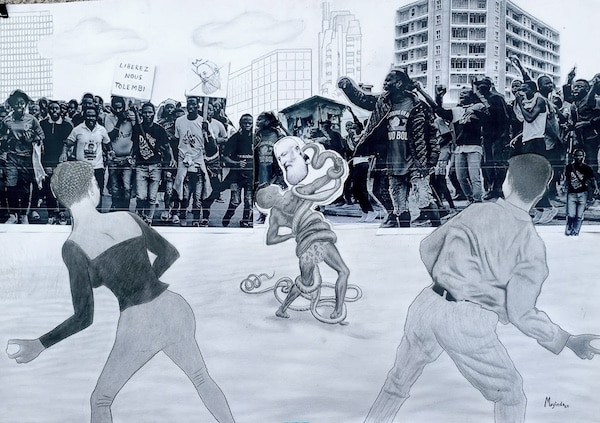Dear friends,
Greetings from the desk of Tricontinental: Institute for Social Research.
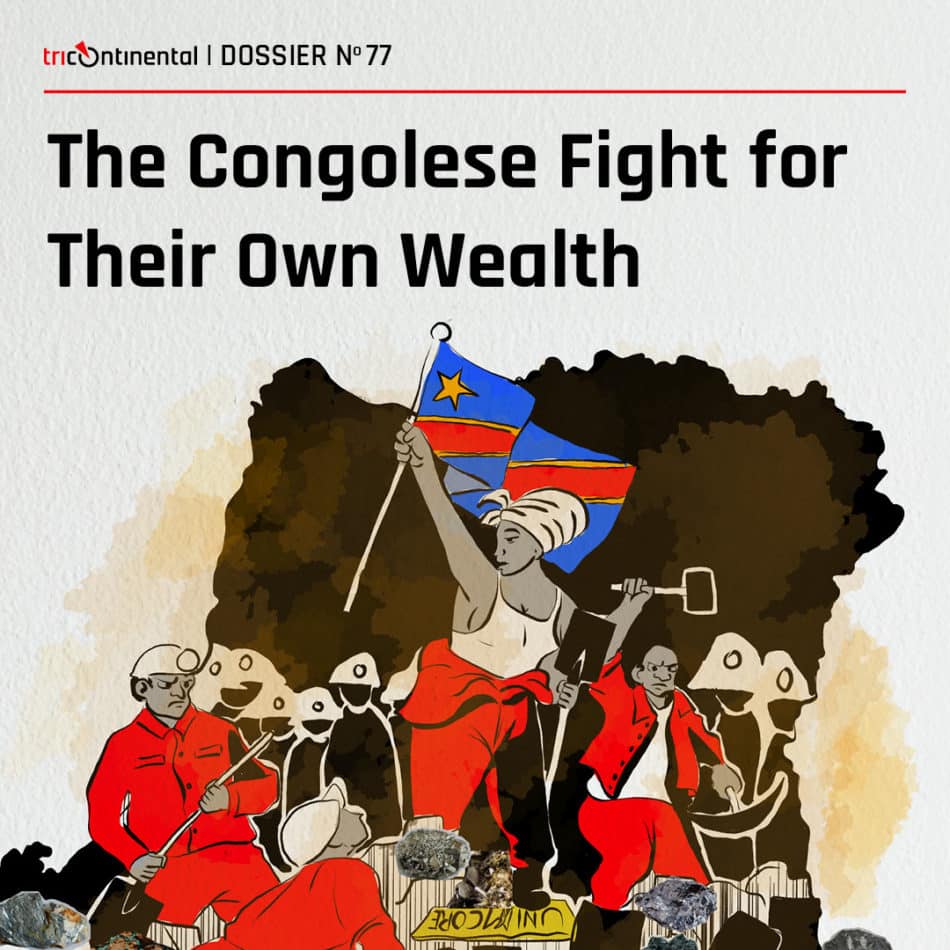
Monsembula Nzaaba Richard or ‘Monzari’ (DRC), L’Aube de la résistance Congolaise (‘Dawn of the Congolese Resistance’), 2024.
On 20 June, the United Nations Security Council (UNSC) condemned the attacks on civilians in the Democratic Republic of the Congo (DRC) ‘in the strongest terms’. In its press statement, the UNSC wrote that these attacks—by both the DRC’s armed forces and various rebel groups supported by neighbouring countries such as Rwanda and Uganda—‘are worsening the volatile security and stability in the Democratic Republic of the Congo and in the region and further exacerbating the current humanitarian situation’. Five days later, on 25 June, the United Nations peacekeeping force in eastern DRC withdrew, in accordance with a December 2023 UNSC resolution that pledged both to provide security for the DRC’s general elections on 20 December and to begin to gradually withdraw the peacekeeping force from the country.
Meanwhile, the Rwandan-backed M23 rebels continue to push steadily into the eastern provinces of the DRC, where there has been an active conflict since the Rwandan genocide in 1994. Over the course of three decades, there has rarely been lasting peace despite several peace accords (most notably the 1999 Lusaka Agreement, the 2002 Pretoria Agreement, the 2002 Luanda Agreement, and the 2003 Sun City Agreement). The total death toll is very poorly recorded, but by all indications, over six million people have been killed. The intractability of the violence in the eastern DRC has led to a sense of hopelessness about the possibility of permanently ending the carnage. This is accompanied by an ignorance of the politics of this conflict and its deep roots both in the colonial history of the Great Lakes region and the fight over raw materials that are key for the electronic age.
To make sense of this conflict, Tricontinental: Institute for Social Research partnered with the Centre Culturel Andrée Blouin, the Centre for Research on the Congo-Kinshasa (CERECK), and Likambo Ya Mabele (‘Land Sovereignty Movement’) to produce a powerful new dossier, The Congolese Fight For Their Own Wealth. Eight years ago, we assembled a team to study the ongoing war, with a particular emphasis on imperialism and the resource theft that has plagued this part of Africa for the past century. The colonisation of the Congo came alongside the theft of the region’s labour, rubber, ivory, and minerals in the 1800s under the rule of Belgium’s King Leopold II. Multinational corporations continue this criminal legacy today by stealing minerals and metals that are essential to the growing digital and ‘green’ economy. This resource wealth is what draws the war into the country. As we show in the dossier, the DRC is one of the richest countries in the world, its untapped mineral reserves alone worth $24 trillion. Yet, at the same time, 74.6% of the population lives on less than $2.15 a day, with one in six Congolese people living in extreme poverty. What accounts for this poverty in a country with so much wealth?
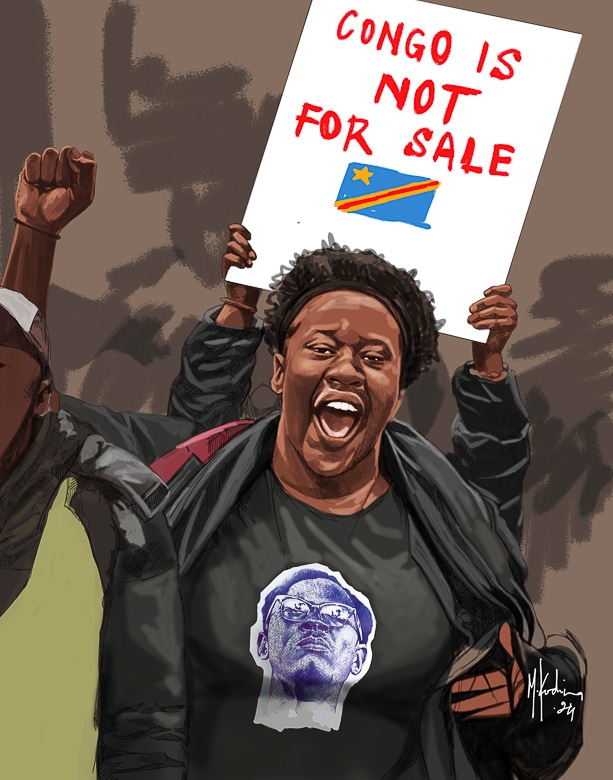
M Kadima (DRC), Congo Is Not for Sale, 2024. Reference photograph by John Behets.
Drawing from archival research and interviews with miners, the dossier shows that the core problem is that the Congolese people do not control their wealth. They have been fighting against rampant theft not only since the 1958 formation of the Mouvement National Congolais (‘Congolese National Movement’), which sought freedom from Belgium and control over the Congo’s extensive natural resources, but even earlier, through working-class resistance between the 1930s and 1950s. This fight has not been easy, nor has it succeeded: the DRC continues to be dominated by exploitation and oppression at the hands of a powerful Congolese oligarchy and multinational corporations that operate with the permission of the former. Furthermore, the country suffers, on the one hand, from wars of aggression by its neighbours Rwanda and Uganda, aided by proxy militia groups, and, on the other, from interference by multilateral institutions such as the World Bank and International Monetary Fund (IMF) that enforce neoliberal policies as a requirement for receiving loans.
Just days before the DRC’s elections in December 2023, the IMF provided a $202.1 million disbursement because it felt confident that whoever won the election would preserve ‘programme objectives, including limiting macroeconomic slippages and continuing implementing the economic reform agenda’. In other words, the IMF believed that it could continue to privatise electricity and draft mining codes that have been overly ‘generous’ to multinational corporations—irrespective of the election results (the word ‘generous’ is from the IMF’s own mission chief for the DRC, Norbert Toé). A pittance from the IMF is able to muffle the call for sovereignty over the DRC’s considerable resources.
The Great Lakes region of Africa has been prevented, on several fronts, from solving the problems that plague it: entrenched neocolonial structures have prevented the construction of well-funded social infrastructure; the extraordinary power of mining companies, until recently largely Australian, European, and North American in origin, have derailed efforts to achieve resource sovereignty; imperial powers have used their money and military power to subordinate the local ruling classes to foreign interests; the weakness of these local ruling classes and their inability to forge a strong patriotic project, such as those attempted by Louis Rwagasore of Burundi and Patrice Lumumba of the DRC (both assassinated by imperial powers in 1961), has hindered regional progress; there is an urgent desire for the creation of such a project that would bring people together around the shared interests of the majority instead of falling prey to ethnic divisions (there are four hundred different ethnic groups in the DRC alone) and tribalism that tear communities apart and weaken their ability to fight for their destiny.
Such a project thrived following the independence of DRC in 1960. In 1966, the government passed a law that allowed it to control all unoccupied land and its attendant minerals. Then in 1973, the DRC’s General Property Law allowed government officials to expropriate land at will. Establishing a project that uses material resources for the betterment of all peoples, rather than stoking ethnic divisions, must again become the central focus. Yet the idea of citizenship in the region remains entangled with ideas of ethnicity that have provoked conflicts along ethnic lines. It was these ideas that led to the genocide in Rwanda in 1994. The absence of a common project has allowed the enemies of the masses to creep through the cracks and exploit the weaknesses of the people.
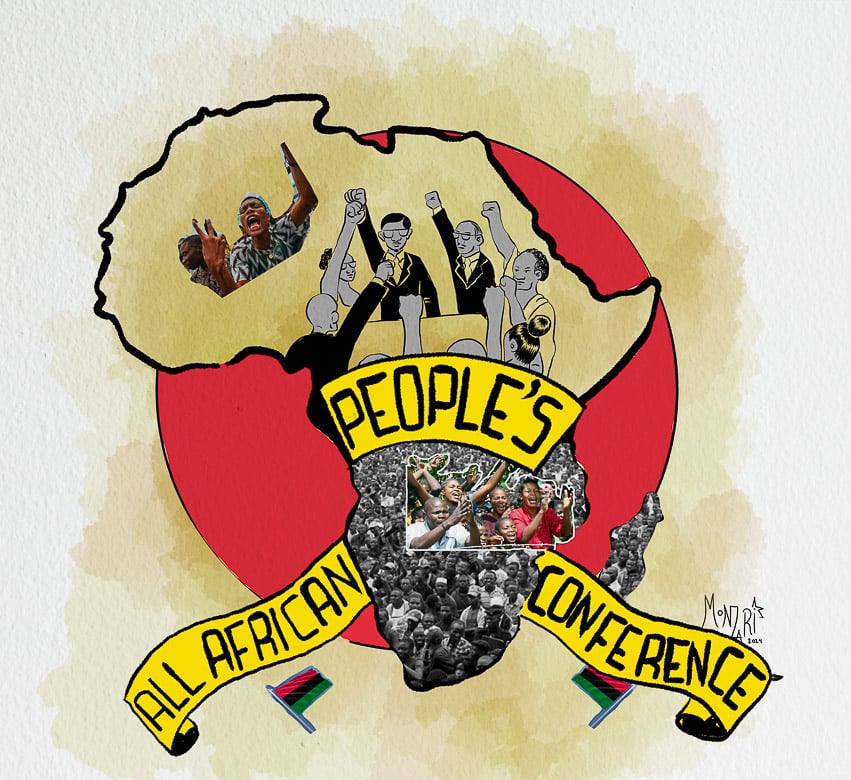
Monsembula Nzaaba Richard or ‘Monzari’ (DRC), Aurore Africaine (‘African Aurora’), 2024.
An alphabet soup of political and military fronts—such as the ADFL, FDLR, RCD, and MLC—catapulted the region into resource wars. Reserves of coltan, copper, and gold as well as control over the border roads between the DRC and Uganda that link the eastern DRC to the Kenyan port of Mombasa made these armed groups and a few powerful people very rich. The war was no longer only about the post-colonial consensus, but also about the wealth that could be siphoned off to benefit an international capitalist class that lives far away from Africa’s Great Lakes.
Fascinatingly, it was only when Chinese capital began to contest the companies domiciled in Australia, Europe, and North America that the question of labour rights in the DRC became a great concern for the ‘international community’. Human rights organisations that formerly turned a blind eye to exploitation began to take a great interest in these matters, coining new phrases such as ‘blood coltan’ and ‘blood gold’ to refer to the primary commodities mined by the Chinese and Russian companies that have set up shop in several African countries. Yet, as our dossier—as well as the Wenhua Zongheng issue ‘China-Africa Relations in the Belt and Road Era’—show, Chinese policy and interests stand in stark contrast to the IMF-driven agenda for the DRC as China seeks to ‘kee[p] mineral and metal processing within the DRC and buil[d] an industrial base for the country’. Furthermore, Chinese firms produce goods that are often made for Global North consumers, an irony that is conveniently ignored in the Western narrative. The international community purports to be concerned with human rights violations but has no interest in the African people’s hopes and dreams; it is driven instead by the interests of the Global North and by the U.S.-led New Cold War.
Young, talented artists spent weeks in the studio coming up with the illustrations featured in the dossier and in this newsletter, the result of a collaboration between our art department and the artists’ collective of the Centre Culturel Andrée Blouin in Kinshasa. Please read our fourth Tricontinental Art Bulletin to learn more about their creative process and watch the video on Artists for Congolese Sovereignty, made by André Ndambi, which introduces the artists’ work.
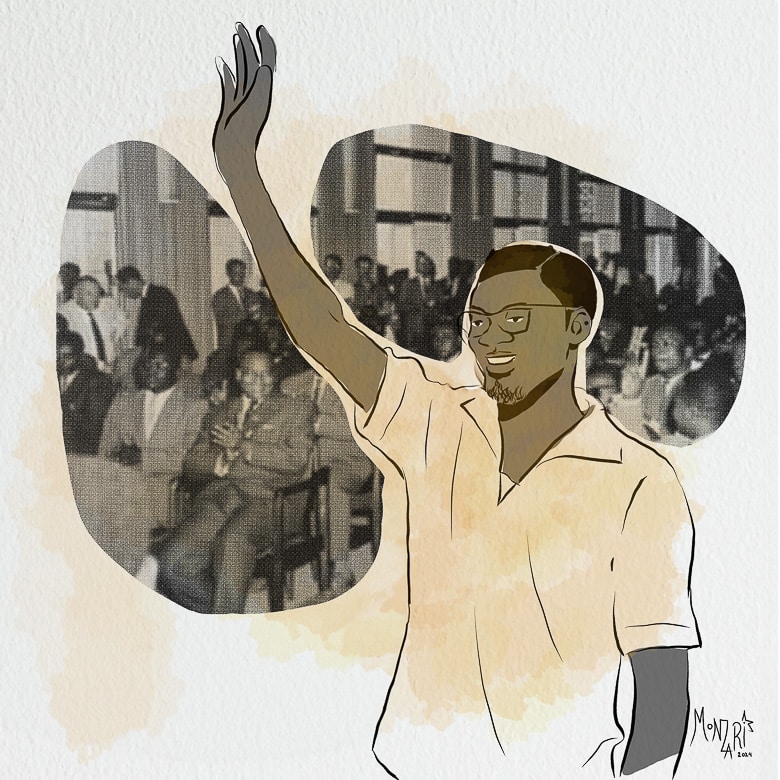
Monsembula Nzaaba Richard or ‘Monzari’ (DRC), Le peuple a gagné (‘The People Have Won’), 2024.
Reference photograph: Congopresse via Wikimedia.
Our dossier ends with the words of Congolese youth who yearn for land, for a patriotic culture, for critical thinking. These young people were born in war, they were raised in war, and they live in war. And yet, they know that the DRC has enough wealth to let them imagine a world without war, a world of peace and social development that surpasses narrow divisions and unending bloodshed.
Warmly,
Vijay

